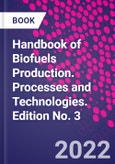Handbook of Biofuels Production: Processes and Technologies, Third Edition provides a comprehensive and systematic reference on a range of biomass conversion processes and technologies. In response to the global increase in the use of biofuels as substitute transportation fuels, advanced chemical, biochemical and thermochemical biofuels production routes are quickly being developed. Substantial additions for this new edition include increased coverage of emerging feedstocks, including microalgae, more emphasis on by-product valorization for biofuels' production, additional chapters on emerging biofuel production methods, and co-production of biofuels and bioproducts.
The book's editorial team is strengthened by the addition of an extra member, and a number of new contributors have been invited to work with authors from the first and second edition to revise existing chapters, with each offering fresh perspectives. This book is an essential reference for professional engineers in the biofuel industry as well as researchers in academia, from post-graduate level and up.
Please Note: This is an On Demand product, delivery may take up to 11 working days after payment has been received.
Table of Contents
Part One: Key Issues and Assessment of Biofuels Production
1. Introduction: An Overview of Biofuels and Production Technologies
2. Multiple Objectives Policy for Biofuels Production: Environmental, Socio-Economic and Regulatory Issues
3. Life Cycle Sustainability Assessment of Biofuels
4. Biofuels: Technology, Economics, And Policy Issues
5. Feedstocks and Challenges to Biofuel Development
Part Two: Biofuels from Chemical and Biochemical Conversion Processes and Technologies
6. Production of Biofuel Via Catalytic Upgrading and Refining of Sustainable Oleagineous Feedstocks
7. Biotechnological Production of Biofuels
8. Biodiesel Production from Microbial Oil Using Oleagineous Microorganisms
9. Biochemical Production of Bioalcohols
10. Production of Biogas Via Anaerobic Digestion
11. Lignocellulose Biorefinery Advances the Liquid Biofuels Platform
12. Chemical Routes for The Conversion Of Cellulosic Platform Molecules Into High-Energy-Density Biofuels
Part Three: Biofuels from Thermal and Thermo-Chemical Conversion Processes And Technologies
13. Catalytic Fast Pyrolysis for Improved Liquid Quality
14. Production of Bio-Syngas and Biohydrogen Via Gasification
15. Production of Biofuels Via Hydrothermal Conversion
16. Production of Biofuels Via Fischer-Tropsch Synthesis: Biomass-To-Liquids
Part Four: Integrated Production and Application of Biofuels
17. Integrated Biorefinery Production of Biofuels and Coproduction Of High Value Products
18. Microalgae for Biofuels: A Prospective Feedstock
19. Utilisation of Biofuels in Diesel Engines
20. Power to X Technologies & CO2 Utilisation








